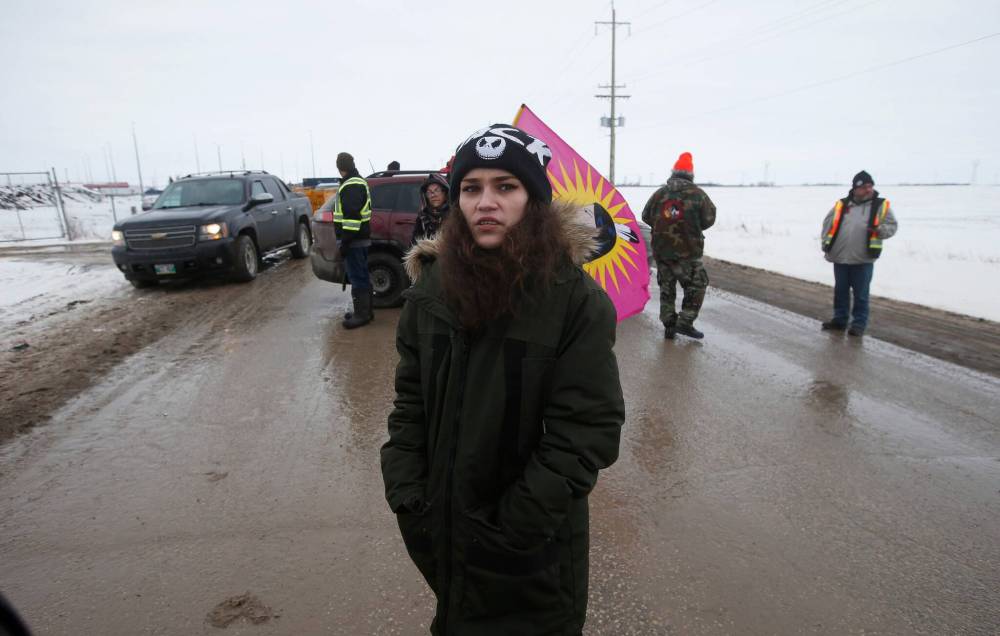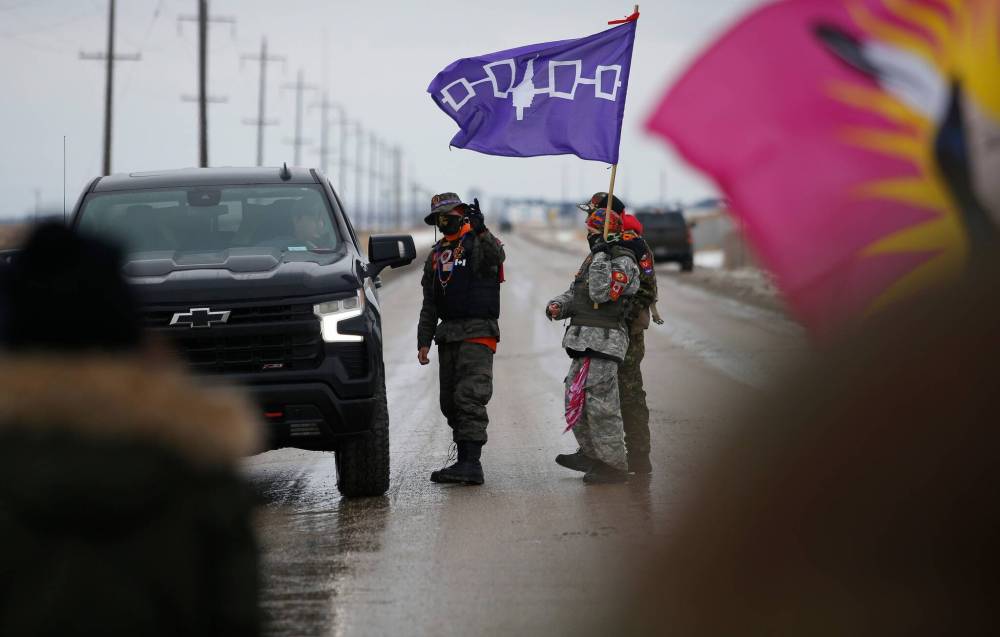Victim’s relatives block landfill
Supporters demand operational halt and a search for missing, murdered Indigenous women
Advertisement
Read this article for free:
or
Already have an account? Log in here »
To continue reading, please subscribe:
Monthly Digital Subscription
$0 for the first 4 weeks*
- Enjoy unlimited reading on winnipegfreepress.com
- Read the E-Edition, our digital replica newspaper
- Access News Break, our award-winning app
- Play interactive puzzles
*No charge for 4 weeks then price increases to the regular rate of $19.00 plus GST every four weeks. Offer available to new and qualified returning subscribers only. Cancel any time.
Monthly Digital Subscription
$4.75/week*
- Enjoy unlimited reading on winnipegfreepress.com
- Read the E-Edition, our digital replica newspaper
- Access News Break, our award-winning app
- Play interactive puzzles
*Billed as $19 plus GST every four weeks. Cancel any time.
To continue reading, please subscribe:
Add Free Press access to your Brandon Sun subscription for only an additional
$1 for the first 4 weeks*
*Your next subscription payment will increase by $1.00 and you will be charged $16.99 plus GST for four weeks. After four weeks, your payment will increase to $23.99 plus GST every four weeks.
Read unlimited articles for free today:
or
Already have an account? Log in here »
Hey there, time traveller!
This article was published 11/12/2022 (1092 days ago), so information in it may no longer be current.
Morgan Harris’s relatives and their supporters blocked access to a Winnipeg landfill Sunday to escalate calls for searches of two sites, including one where her remains are believed to be.
About two dozen people took part in a blockade of the Brady Road landfill on Winnipeg’s southern limits to demand a halt to operations and a search for missing or murdered Indigenous women who may be there, including Tanya Nepinak.
“How many other women are they not looking for? What we’re dealing with here, potentially, is a mass burial site,” said Harris’s daughter, Cambria, noting the group is prepared to stay there for a lengthy period.

JOHN WOODS / WINNIPEG FREE PRESS
Cambria Harris, daughter of Morgan Harris, stands at the entrance to the Brady Road landfill Sunday, where about two dozen people took part in a blockade.
A second group gathered at the privately-owned Prairie Green Landfill just north of the city, where city police believe the remains of Harris, 39, and Marcedes Myran, 26, are located.
A sacred fire was lit near the entrance to Prairie Green.
Their call for action demanded police services and governments do more to bring an end to violence against Indigenous women and girls.
After blocking Brady Road around 1:45 p.m., participants explained their reasons to drivers while turning private and commercial vehicles away.
Police were aware of the situation, but did not attend as of late afternoon.
“We support our citizens’ right to peacefully, legally and safely protest,” spokesman Const. Claude Chancy wrote in an email.
Alleged serial killer Jeremy Skibicki, 35, is charged with four counts of first-degree murder in the deaths of Indigenous women Harris, Myran, Rebecca Contois and an unidentified victim who’s been named Buffalo Woman by elders.
The investigation began when Contois’s partial remains were found in a garbage bin in North Kildonan in May. Additional remains belonging to the 24-year-old were found when police searched the city-run Brady Road landfill in June.
Detectives believe Buffalo Woman was killed in mid-March. They do not have a definitive location of her remains.
Police suspect Harris and Myran’s remains were deposited at Prairie Green, in the Rural Municipality of Rosser, after they were killed in May.
Both women were members of Long Plain First Nation.
Family members held search parties for Harris, who was reported missing May 1.
“We didn’t want to give up. I believed we were going to find her,” said her cousin, Melissa Normand.
Cambria Harris recalled her mother’s sense of humour and kind nature, while explaining how the woman was failed by a number of systems.
A third-generation residential school survivor who was placed in foster care, Morgan Harris experienced homelessness and addiction, her family said.
“She wasn’t given the best hand in life, but she always tried to do the best she could,” said her cousin, Kirstin Witwicki. “She was so funny and so loyal. I always say she was so fearless, and it was true.”
Prairie Green’s owner, Waste Connections of Canada, halted operations last week amid ongoing discussions at various levels about the possibility of searching the four-acre landfill.
Indigenous leaders, the city, province and Ottawa are involved in exploring options, after police said a search wasn’t feasible.
Harris’s relatives said Long Plain Chief Kyra Wilson has received offers of help from search and recovery experts.
The pause in operations at Prairie Green is meant to give time to identify “what groups and what expertise” need to be consulted, and that will happen over the next few days, said Colin Fast, a spokesman for Mayor Scott Gillingham.
Coun. Markus Chambers, who chairs the Winnipeg Police Board, said chiefs of the impacted First Nations have been asked to contact the WPS for additional briefings that were given to the board.
“At this point and time we will listen to the community to find a path forward,” he wrote in an email. “This may also involve consulting with industry experts to determine if a search can be done and the feasibility of actually finding remains.

JOHN WOODS / WINNIPEG FREE PRESS
Vehicles were turned around as about two dozen people took part in a blockade of the Brady Road landfill Sunday.
“We will also consider other options if remains cannot be found, but I cannot speculate what those other options may be at this time.”
A spokesman for the Manitoba government said the WPS is the lead agency on the matter, but the province is prepared to provide any required or requested assistance.
Police Chief Danny Smyth previously said a site assessment by the forensic unit found there was “no hope” of finding remains for reasons including the overwhelming amount of waste at the site and safety concerns.
Police said a total of 34 days had elapsed before officers learned, on June 20, that Harris and Myran’s remains were believed to be there.
In that time, about 10,000 truckloads of waste was disposed of at the site. Refuse has been compacted with 9,000 tonnes of wet clay.
The devastated families of Harris and Myran, along with Indigenous leaders, are urging police to reconsider.
“It is feasible and it can be done. Our family deserves that,” said Normand.
“We’ll (search) it ourselves. We’ll take it into our own hands,” said Cambria Harris, who noted the remains of Nepinak, who went missing in Winnipeg in 2011, are believed to be at Brady Road.
Police did not find the missing 31-year-old’s remains during a search that lasted about a week in 2012.
A second-degree murder charge against Shawn Lamb was later stayed due to a lack of evidence. He pleaded guilty to manslaughter in the deaths of Indigenous women Carolyn Sinclair and Lorna Blacksmith.
Cambria Harris travelled to Ottawa with her sister, Kera, other family members and Indigenous leaders last week to call for action amid the Assembly of First Nations special chiefs assembly.
During a private meeting, she said, Prime Minister Justin Trudeau offered condolences and pledged his government will look into what it would take to search Prairie Green.
Before relatives left for Ottawa, police officers met them at Winnipeg’s airport to explain the reasons for not searching Prairie Green.
“It’s so disappointing, but not surprising, we’re in a place in the world, in this city where they thought they were going to sit there and tell us they weren’t going to search for the women, and that we’re going to take that,” said Witwicki. “I hope our words are enough to spur them into action.”
Cambria Harris is willing to meet with Smyth, who last week said he is open to discussions with Indigenous groups and further exploring whether it is possible to recover the women’s remains, while resisting calls to resign.
Cambria Harris said she will hold the police chief to his pledges to protect women and pursue justice for the families of the women Skibicki is accused of killing.
“This is an opportunity to realize your words have value,” she said.
chris.kitching@freepress.mb.ca
Twitter: @chriskitching
As a general assignment reporter, Chris covers a little bit of everything for the Free Press.
Our newsroom depends on a growing audience of readers to power our journalism. If you are not a paid reader, please consider becoming a subscriber.
Our newsroom depends on its audience of readers to power our journalism. Thank you for your support.















